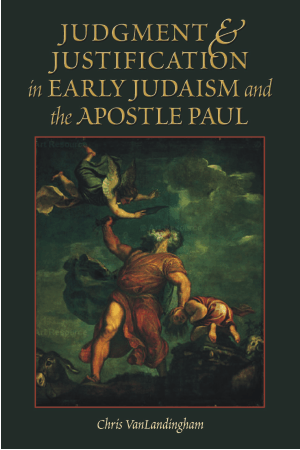Chris VanLandingham interview Part 3 of 3

Chris Tilling: I was thrilled that Mike Bird suggested a few questions to put to Chris VanL. Not only has Mike recently published a book on Paul and justification, he has also written a helpful review of Chris' book. Below are Mike's questions together with Chris VanL's responses.
Mike Bird: 5) What role does assurance have for faith in Paul? [A bit of background: It was this issue that, I think most of all, differentiated the Reformers from the Catholic Church during the Reformation. The Reformers claimed that Christians can have assurance, in some cases they reduced faith to assurance, while Catholics denied it].
Chris VanL: Assurance, if by this term you mean guarantee, has no role in Paul, just as it has no role in any other early Christian author. I prefer the word "confidence" instead of assurance. Since I treat this issue at length, I'll not get into my arguments, but admittedly if one selects a few verses here or there, my statement could appear unsupported. I try to take into account all of Paul's statements.
Mike Bird: 6) Does Rom. 8.1 treat the eschatological verdict as a stated reality for believers?
Chris VanL: Romans 8:1 does not address the eschatological verdict directly. (I would replace the word "verdict" with "finding", which is what I think the judgment is all about.) "Being in Christ" entails more than you assume in your question. "Being in Christ" involves far more than simply having faith, but encompasses obedience to God, that is, living by the Spirit and putting to death the deeds of the body (8:13 et al.). So the Rom 8:1 statement of "no condemnation" is a stated reality as long as the conditions outlined in Rom 8:1-13 (and elsewhere) are met. This being the case, at the judgment God will find that the believer, being in Christ, is righteous and thus will pass muster. With regard to the Last Judgment in Paul, Romans 8:1 may appear to be so clear as to obviate the need to consider other texts, but in reality Rom 8:1 is less clear than Rom 8:13 and far less clear than Rom 2:6-11.
Mike Bird: 7) Does Rom. 10.-9-10 equate eschatological salvation with eschatological justification (in distinction to your arguments that salvation and justification are quite distinct)? [Käsemann's exposition is good on this].
Chris VanL: I am not sure what you mean by "eschatological justification" since "justification" does not appear to be eschatological (again, "justification" is a mistranslation). I guess you're not convinced by the typical differences in verb tenses between the righteous verb and the salvation verb. This aspect is much clearer in Rom 5:9-11, which is why I treat the two passages together. The language of Rom 10:10 "for righteousness" and "for salvation" is ambiguous, and so I would prefer to interpret the more ambiguous passage in light of the more clear passage. However, Rom 10:9-10 is a strange interpretation of Deut 30:14 in which Paul is bound somewhat by his proof-text. Still, I think Rom 10:9-10 is a summary statement that encompasses in succinct fashion more than what is specifically stated. In other words, Rom 10:9-10 is not the whole story. By this point in Romans, Paul has said quite a bit on this subject—none of which can be ignored in favor of Rom 10:9-10. I understand the question, and if Rom 10:9-10 were all that Paul has stated, then I could not make the claims I do. But what makes Rom 10:9-10 more important than Rom 2:6-16, where along with a number of other texts, being righteous and salvation are distinct? What if I thought Rom 2:6-16 was the whole story, would that be acceptable? Mike has legitimate questions about Rom 8:1 and 10:9-10, but isn't the real issue how we should reconcile Rom 10:9-10 with Rom 2:6-16, or Rom 5:9 with Rom 8:13, or Rom 6:23 with 6:16 and 19, or Gal 3:10 with 1 Cor 7:19, or Phil 4:3 with Phil 2:12 and on and on and on? A Pauline theology created solely from Rom 10:9-10, Rom 5:9, Rom 6:23, Gal 3:10, Phil 4:3 etc. is quite a bit different from a theology created solely from Rom 2:6-16, Rom 8:13, Rom 6:16, 19, 1 Cor 7:19, Phil 2:12 etc. So, again, I think the issue is reconciling the seemingly contradictory texts in Paul. I look to post-biblical Judaism for help, partly because I think Paul considered himself a true Jew and his faith the only legitimate form of Judaism.
Mike Bird: 8) During your book you were not able to interact with H. Cremer about the relational view of tsdaq/dikai- that he championed. How would you respond to Cremer's arguments for a relational understanding of righteousness in a place such as Genesis 38?
Chris VanL: I read Cremer's book early on in my research, but since it was so old I didn't feel it necessary to take up his arguments directly. As I recall, I preferred to argue with recent scholarship, which takes into account Cremer's positions.
Hopefully, I have been able to clarify my positions or help those struggling to understand where I am coming from. From some of the posts on my book, it is obvious to me that some are quite upset with my theses. I can't help that, but be assured that I had no agenda or axe to grind in this project.
Chris Tilling: My thanks once again to Chris for having taken the time to write such helpful responses! He has done us all a service by being so open for dialogue.
Labels: VanLandingham








